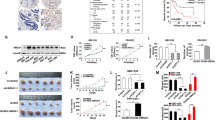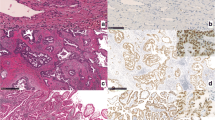Abstract
Background
Elevated expression of eukaryotic initiation factor 3c (eIF3C) was recently uncovered to promote several types of cancer progression by inducing cell proliferation. Here, we aimed to assess the expression and prognostic value of eIF3C in intrahepatic cholangiocarcinoma (ICC) patients.
Methods
Expression of eIF3C was analyzed by immunohistochemistry in tissue microarrays (TMAs) containing 138 ICC and paired peritumoral tissues from ICC patients. Then, the roles of eIF3C in ICC cells were investigated by RNA interference, and the relationship between the eIF3C and KI67 expression was explored in ICC cells and tissues. Finally, the relation between the eIF3C level and clinicopathologic features of ICC was probed, and Kaplan–Meier and Cox’s analyses were performed to assess the prognostic merit of eIF3C and KI67 in ICC patients.
Results
The expression of eIF3C was elevated in ICC tissues compared to paired peritumoral tissues, which was consistent with the result from the GEPIA database. The downregulation of eIF3C in ICC cells impaired the cellular invasion, metastasis, colony formation, and proliferation. Moreover, we further found a positive relationship between the eIF3C and KI67 expression in ICC cells and tissues. The expression of eIF3C in ICC tissues was positively correlated with lymphatic metastasis (p = 0.049), and the high level of KI67 was frequently found in ICC patients with the large tumor (p = 0.028), high serum AFP (p = 0.019), or lymphatic metastasis (p = 0.039). Notably, patients with the eIF3C or KI67 overexpression had shorter overall survival and higher disease-free survival rates than those with low expression of eIF3C or KI67, and the combination of eIF3C or KI67 expression was an independent parameter for predicting the prognosis and recurrence of ICC patients.
Conclusions
Elevated eIF3C expression promotes ICC development, and combination of eIF3C and KI67 is a valuable predictor of the survival and recurrence of ICC patient.




Similar content being viewed by others
Abbreviations
- ICC:
-
Intrahepatic cholangiocarcinoma
- eIF3C:
-
Eukaryotic translation initiation factor 3 subunit C
- IHC:
-
Immunohistochemistry
- TMA:
-
Tissue microarray
- eIF4E:
-
Eukaryotic initiation factor 4E
- OS:
-
Overall survival
- DFS:
-
Disease-free survival
- HCC:
-
Hepatocellular carcinoma
References
Huang XY, Ke AW, Shi GM, Ding ZB, Devbhandari RP, Gu FM, Li QL, Dai Z, Zhou J, Fan J. Overexpression of CD151 as an adverse marker for intrahepatic cholangiocarcinoma patients. Cancer 2010;116:5440–5451.
Wang C, Pang S, Si-Ma H, Yang N, Zhang H, Fu Y, Yang G. Specific risk factors contributing to early and late recurrences of intrahepatic cholangiocarcinoma after curative resection. World J Surg Oncol 2019;17:2.
Shintani T, Higashisaka K, Maeda M, Hamada M, Tsuji R, Kurihara K, Kashiwagi Y, Sato A, Obana M, Yamamoto A, Kawasaki K, Lin Y, Kijima T, Kinehara Y, Miwa Y, Maeda S, Morii E, Kumanogoh A, Tsutsumi Y, Nagatomo I, Fujio Y. Eukaryotic translation initiation factor 3 subunit C is associated with acquired resistance to erlotinib in non-small cell lung cancer. Oncotarget 2018;9:37520–37533.
Liu T, Wei Q, Jin J, Luo Q, Liu Y, Yang Y, Cheng C, Li L, Pi J, Si Y, Xiao H, Li L, Rao S, Wang F, Yu J, Yu J, Zou D, Yi P. The m6A reader YTHDF1 promotes ovarian cancer progression via augmenting EIF3C translation. Nucl Acids Res 2020;48:3816–3831.
Emmanuel R, Weinstein S, Landesman-Milo D, Peer D. eIF3c: a potential therapeutic target for cancer. Cancer Lett 2013;336:158–166.
Bhat M, Robichaud N, Hulea L, Sonenberg N, Pelletier J, Topisirovic I. Targeting the translation machinery in cancer. Nat Rev Drug Discov 2015;14:261–278.
Peng R, Huang X, Zhang C, Yang X, Xu Y, Bai D. Overexpression of UHRF2 in intrahepatic cholangiocarcinoma and its clinical significance. Onco Targets Ther 2017;10:5863–5872.
Peng R, Zhang PF, Zhang C, Huang XY, Ding YB, Deng B, Bai DS, Xu YP. Elevated TRIM44 promotes intrahepatic cholangiocarcinoma progression by inducing cell EMT via MAPK signaling. Cancer Med 2018;7:796–808.
Wen F, Wu ZY, Nie L, Zhang QZ, Qin YK, Zhou ZL, Wu JJ, Zhao X, Tan J, Sawmiller D, Zi D. Eukaryotic initiation factor 3, subunit C silencing inhibits cell proliferation and promotes apoptosis in human ovarian cancer cells. Biosci Rep 2019;39:BSR20191124.
Zhang H, Yang T, Wu M, Shen F. Intrahepatic cholangiocarcinoma: epidemiology, risk factors, diagnosis and surgical management. Cancer Lett 2016;379:198–205.
Xie N, Cai JB, Zhang L, Zhang PF, Shen YH, Yang X, Lu JC, Gao DM, Kang Q, Liu LX, Zhang C, Huang XY, Zou H, Zhang XY, Song ZJ, Sun HX, Fu BM, Ke AW, Shi GM. Upregulation of B7–H4 promotes tumor progression of intrahepatic cholangiocarcinoma. Cell Death Dis 2017;8:3205.
Chun YS, Javle M. Systemic and adjuvant therapies for intrahepatic cholangiocarcinoma. Cancer Control 2017;24:1073274817729241.
Kouba T, Rutkai E, Karaskova M, Valasek L. The eIF3c/NIP1 PCI domain interacts with RNA and RACK1/ASC1 and promotes assembly of translation preinitiation complexes. Nucl Acids Res 2012;40:2683–2699.
Lee HY, Chen CK, Ho CM, Lee SS, Chang CY, Chen KJ, Jou YS. EIF3C-enhanced exosome secretion promotes angiogenesis and tumorigenesis of human hepatocellular carcinoma. Oncotarget 2018;9:13193–13205.
Joazeiro CAP. Ribosomal stalling during translation: providing substrates for ribosome-associated protein quality control. Annu Rev Cell Dev Biol 2017;33:343–368.
Obayashi E, Luna RE, Nagata T, Martin-Marcos P, Hiraishi H, Singh CR, Erzberger JP, Zhang F, Arthanari H, Morris J, Pellarin R, Moore C, Harmon I, Papadopoulos E, Yoshida H, Nasr ML, Unzai S, Thompson B, Aube E, Hustak S, Stengel F, Dagraca E, Ananbandam A, Gao P, Urano T, Hinnebusch AG, Wagner G, Asano K. Molecular landscape of the ribosome pre-initiation complex during mRNA scanning: structural role for eIF3c and its control by eIF5. Cell Rep 2017;18:2651–2663.
Sonenberg N, Hinnebusch AG. Regulation of translation initiation in eukaryotes: mechanisms and biological targets. Cell 2009;136:731–745.
Song N, Wang Y, Gu XD, Chen ZY, Shi LB. Effect of siRNA-mediated knockdown of eIF3c gene on survival of colon cancer cells. J Zhejiang Univ Sci B. 2013;14:451–459.
Gao W, Hu Y, Zhang Z, Du G, Yin L, Yin Z. Knockdown of EIF3C promotes human U-2OS cells apoptosis through increased CASP3/7 and Chk1/2 by upregulating SAPK/JNK. Onco Targets Ther 2019;12:1225–1235.
Fan M, Wang K, Wei X, Yao H, Chen Z, He X. Upregulated expression of eIF3C is associated with malignant behavior in renal cell carcinoma. Int J Oncol 2019;55:1385–1395.
Smolle MA, Czapiewski P, Lapinska-Szumczyk S, Majewska H, Supernat A, Zaczek A, Biernat W, Golob-Schwarzl N, Haybaeck J. The prognostic significance of eukaryotic translation initiation factors (eIFs) in endometrial cancer. Int J Mol Sci 2019;20:6169.
Author information
Authors and Affiliations
Corresponding author
Ethics declarations
Conflict of interest
We confirm that there is no potential conflict of interest or financial dependence regarding this paper.
Additional information
Publisher's Note
Springer Nature remains neutral with regard to jurisdictional claims in published maps and institutional affiliations.
Rights and permissions
About this article
Cite this article
Xu, YP., Dong, ZN., Zhou, YQ. et al. Role of eIF3C Overexpression in Predicting Prognosis of Intrahepatic Cholangiocarcinoma. Dig Dis Sci 67, 559–568 (2022). https://doi.org/10.1007/s10620-021-06878-7
Received:
Accepted:
Published:
Issue Date:
DOI: https://doi.org/10.1007/s10620-021-06878-7




